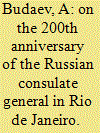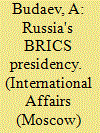| Srl | Item |
| 1 |
ID:
137306


|
|
|
|
|
| Summary/Abstract |
RECENTLY, soft power as an important factor of international relations and interstate communication has come to the fore in international and Russian political discourse. At the turn of the 1990s, well-known American political scientist and neoliberal Joseph Nye, Jr. offered his now famous and widely used formula: "What is soft power? It is the ability to get what you want through attraction rather than coercion or payments"1 and specified: "The ability to affect what other countries want tends to be associated with intangible power resources such as culture, ideology and institutions."2 Later, the formula was extended to include attractive domestic policies, economic achievements and even the (American) life style and (American) values.
|
|
|
|
|
|
|
|
|
|
|
|
|
|
|
|
| 2 |
ID:
107858


|
|
|
| 3 |
ID:
141947


|
|
|
|
|
| Summary/Abstract |
THE IMPORTANCE of "soft power" politics, which, in conjunction with traditional diplomatic tools, enables the principal actors of international relations to ensure their national interests in a more effective way and on a long-term basis, objectively increases at the current transitional stage in world development, which is characterized by the exacerbation of a number of disagreements and problems, the escalation of conflicts and a lower level of predictability. More states, which are laying claim to global leadership, including Russia and other BRICS countries, use "soft power" in their political strategies to create a favorable external environment for internal development and address practical issues related to modernization and the expansion of the area of their influence.
|
|
|
|
|
|
|
|
|
|
|
|
|
|
|
|